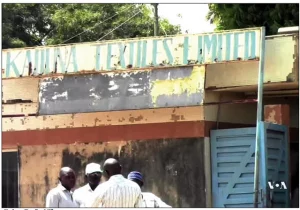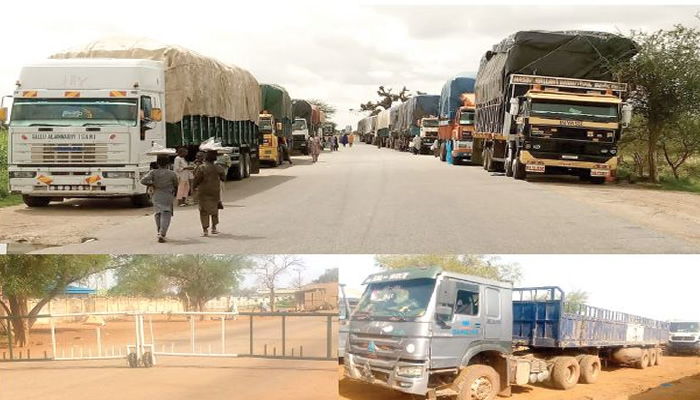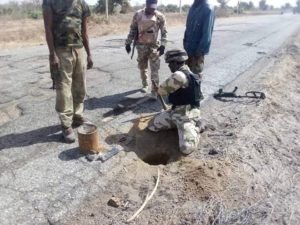By BASHIR ADEFAKA
The trucks’ queues build-up, at Illela town, Nigeria/Kwani town, Niger and other border communities connecting the Federal Republic of Nigeria with the Republic of Niger shut down as a result of coup deta’t in that neighbouring country, has exposed how Nigeria’s biggest job creating economic sector collapsed and its revival has remained unachievable.
This revelation was made during a media interview with the duo of Director General of the Nigerian Textile Manufacturers Association (NTMA), Alhaji Hamma Kwajaffa, and Treasurer of the all-important textile manufacturers association, Mr. Samson Agbeseyi, in Ikeja, at the weekend.
Their lamentations were coming barely 48 hours after The DEFENDER Newspaper (Online) had, in its special report titled, “The Tinubu’s broadcast address and Ade Dosunmu’s 10-year-old thoughts on growing Nigeria” published on Thursday August 3, 2023, called attention of the Bola Tinubu-led Federal Government to the collapse of textile mills among other industries as reason for the woes of Nigerian economy.

Moribund Kaduna Textile Limited.
According to the report, “The setback the nation’s industrial hub of the old has faced tells it all. Tinubu is from the defunct Western Region and he should be asked what has he found out happened to the Cocoa Board and the Cocoa Depot on Oba Akran Avenue Ikeja and first Nigerian 25-storey building, the Cocoa House Ibadan. Now, as Yoruba man with chance to rule Nigeria, which the achiever of those legacies of the old – Chief Obafemi Awolowo – could not have, how is he planning to revive that segment of the economy since Cocoa remains a cash crop still doing well in the international market?
Textiles
“Another question we should ask is, what happened to the Arewa Textile Mills Kaduna, United Nigerian Textile Mills in Ikeja and others including all the components of the Cotton-Textile-Garment (CTG) value chain that had contributed immensely to economy in the past but are now irreparably moribund? The Utagba Uno, Agbor, Delta State and the Araromi-Ore, Ondo State rubber plantations that had hosted Michellin Tyres production company generating a great deal of employment in the past, how did they slip off the hands of Nigeria’s Ministry of Trades, Commerce and Investments that we now become a mono-economy nation with only oil as our source of survival? These are the problems,” The DEFENDER had said in the special report on Thursday.

Alhaji Hamma Kwajaffa, Director General, Nigerian Textile Manufacturers Association (NTMA). PHOTO: DEFENDER MEDIA LIMITED
Reacting to the report on Saturday, the NTMA Director General, Alhaji Hamma Kwajaffa, said the collapse of Cotton-Textile-Garment value chain of the Nigerian economy led to the almost unprecedented level of insecurity that Nigeria has witnessed, especially since the return of democracy in 1999.
Citing the fact that most of the trucks stranded currently at Illela Border in Sokoto and other borders in Zamfara and Katsina states linking Nigeria with Republic of Niger are laden with textile materials, Kwajaffa said it is now evident how land borders, particularly in Northern Nigeria side, are used as conduit pipes to drain away successes that the country had achieved in textile business in the past, when textile workers were kings and the industry was the biggest employer of labour.
According to the DG, “Government of Nigeria should come down to border security and see what is happening. We, local manufacturers of textiles, are required to use pure cotton but those who do not use pure cotton are allowed to bring in their products through the land borders and local manufacturers are still expected to compete with their cheaper though substandard products made of polyester in the same market. This is what killed the textile industry in Nigeria.
“There is no other sector of the economy that can absorb the huge employment deficit in the country like CTG, the Cotton-Textile-Garment value chain. When textile was in its prime, it mattered more to national economy than even the oil. It was because of this value chain that railways became necessary in the past because it gave room for abundance of jobs creation and improved foreign exchange to the extent that Nigerian Naira rated far higher than the Dollar, when the Nigerian Textile Industry and other items of the value chain of cotton and garment were working,” Kwajaffa recalled.
During his visit to Illela Border Station on Friday to assess compliance with the border closure, Acting Comptroller-General of Customs, CGC Bashir Adewale Adeniyi had said the border closure, which is based on the order of President Bola Ahmed Tinubu, was not to inflict sufferings on Nigerians.
Kwajaffa commended President Tinubu for, at least, taking the bold step to shut down the borders between Nigeria and Niger at this time. “But there should be more reason for such closure of the borders than the reason of checkmating the coup plotters of Niger,” the NTM DG urged the President.
He added that the “Nigerian administration should sit down and really think about the challenges of the Cotton-Textile-Garment value chain sector of the economy and be bolder about tackling them headlong.”
He listed the benefits of Cotton-Textile-Garment revival in Nigeria saying, “By so doing, it will help bring stability to the polity. There is unrest in the land because people, whose jobs were largely catered for by the cotton farming, textile industries and garment factories in the past, have been rendered jobless for too long because of the collapse of the textiles and so they became ready tools for recruits into the Boko Haram terrorism and other insurgency business of the insecurity that we have had.”
Contributing, the National Treasurer of the Nigerian Textile Manufacturers Association (NTMA), Mr. Samson Agbeseyi, corroborated the DG on how collapse of textile industry was major reason for the insecurity especially in Northern Nigeria, citing the former Sardauna Ahmadu Bello-led region as part of the country with highest percentage of involvement in the business of cotton farming, textile industries and garment factories.
“Some of those recruits of Boko Haram are accepting to be recruited because there is no job. And since the idle hand is said to be the devil’s workshop, hence the rise in the cases of insurgencies that have plagued mostly the North over the years,” Agbeseyi said.
Those trucks at Illela Border now stranded, the NTMA chieftains both contended, are using that border as conduit pipe to drain away the economic growth and other opportunities accruable from textile successes of Nigeria and, by so doing, are killing their own nation’s economy by making jobs flight into other countries.
Those textile materials being brought into Nigeria are found out not to even be from Niger but the neighbouring country is, more evidently, used as corridor for moving the cheaper yet substandard products made of polyester they bring into the country and with which those of higher quality but logically expensive products by local manufacturers are expected to compete with in the same market.
Because most Nigerians do not care about pure quality materials with zero negative effect in their health system, investigations showed that they always ignorantly go for the smuggled cheaper but substandard materials, despite the negative effects they materials used in making them have in their health system.
“Many of those trucks are usually loaded with textile materials and they are substandard products but cheaper. Those are the materials they used to kill the local textile industries and, by extension, the other members of the value chain such as cotton and garment,” Kwajaffa lamented.




